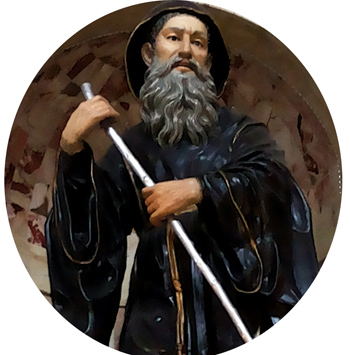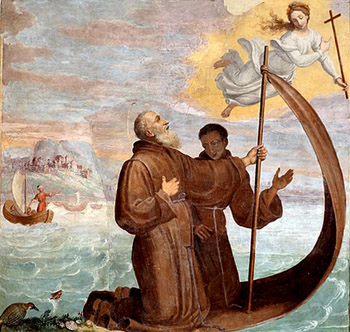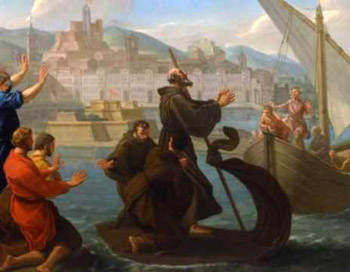Stories & Legends
 |
 |
 |
 |
 |
 |
 |
St. Francis of Paola Walking on the Waters
The immensely popular Saint of Paola, Francis, born Francesco Martolilla, lived from 1416 to 1507. He was the founder of the Order of Minims, a religious order committed to perpetual abstinence and acts of humility, and was never ordained a priest. The name of the Order, Minims, refers to the members’ role as “the least of all the faithful,” as their founder expressed it.
Because of one of his most famous miracle, which I will recount below, St. Francis of Paola has become the patron of sailors, mariners and naval officers.
 St. Francis and his companion were on their way to Sicily and had to cross the Straits of Messina to reach the port city. He presented himself with his companion to the boatman at the ferry-crossing, one Pietro Coloso, saying:
St. Francis and his companion were on their way to Sicily and had to cross the Straits of Messina to reach the port city. He presented himself with his companion to the boatman at the ferry-crossing, one Pietro Coloso, saying:
"For the sake of Christian charity, my brother, take us across to the island in your barque."
But the boatman, being ignorant of the holiness of the one who thus begged, demanded the price of the passage from him. When St. Francis answered that he did not have the coins, the boatman replied that he had no barque to take them in.
The people of Arena, who had accompanied the Saint and were present at this refusal of his request, begged the boatman to allow these poor Brothers to embark, saying that he might rest assured that one of them was a Saint.
"If he is a Saint," answered Pietro with the greatest incivility, "let him walk on the waters, and work miracles."
Not in any way disturbed by the rude behavior of the jeering mariner, the Saint separated himself a little from the others, and in prayer, invoked divine aid in his difficulty. On returning to his companion, he said: "Be of good cheer, my son, by the grace of God, we have a better ship in which we can cross over."
But Brother Giovanni, who was innocent and simple, seeing no other vessel, said: "With which barque shall we cross over, my Father, since this one has refused us?"
 He replied: "The Lord has provided us with another good and safer ship, with this my cloak," which he now proceeded to spread over the water.
He replied: "The Lord has provided us with another good and safer ship, with this my cloak," which he now proceeded to spread over the water.
Brother Giovanni smiled and said, with his usual simplicity: "At least let us cross on my cloak, which will carry us better, because it is new and not so patched as yours."
But, in the end our Saint spread his cloak on the water and blessed it in the name of God. Then, lifting up a part of the cloak like a little sail, and supporting it with his staff as a mast, he with his companions stepped on to this marvelous vessel and sailed away to the amazement of those of Arena, who watched from the shore.
The strange boat rapidly hastened through the water. The unfriendly boatman now changed his tune and implored pardon of him for the refusal of his request, begging him to return and enter his ship. But God, who for the glory of His Holy Name, desired to manifest that he had put not only Earth and Fire in subjection to our Saint, but also the water, caused him to refuse this offer, and to arrive in port before the ferry boat and its passengers.
Inspired by this miracle of his name saint, Franz Liszt (1811-1886) wrote a solo piano piece called “Saint Francis of Paola Walking on the Waves,” which describes in music the incident from the life of St. Francis of Paola. The story is beautifully captured in Liszt's music.
The calm strength of the opening hymn-like music is throughout the piece pitted against the roaring and crashing of the waves (represented by rushing scales and tremolos), finally emerging victorious in a glorious fortissimo restatement at the end of the piece in what he called "The universal theme of struggle and triumph."
Liszt’s piece, written in Rome toward the end of his life, lasts about eight minutes and is well-worth listening to.


Because of one of his most famous miracle, which I will recount below, St. Francis of Paola has become the patron of sailors, mariners and naval officers.

The Saint of Paola with his staff
"For the sake of Christian charity, my brother, take us across to the island in your barque."
But the boatman, being ignorant of the holiness of the one who thus begged, demanded the price of the passage from him. When St. Francis answered that he did not have the coins, the boatman replied that he had no barque to take them in.
The people of Arena, who had accompanied the Saint and were present at this refusal of his request, begged the boatman to allow these poor Brothers to embark, saying that he might rest assured that one of them was a Saint.
"If he is a Saint," answered Pietro with the greatest incivility, "let him walk on the waters, and work miracles."
Not in any way disturbed by the rude behavior of the jeering mariner, the Saint separated himself a little from the others, and in prayer, invoked divine aid in his difficulty. On returning to his companion, he said: "Be of good cheer, my son, by the grace of God, we have a better ship in which we can cross over."
But Brother Giovanni, who was innocent and simple, seeing no other vessel, said: "With which barque shall we cross over, my Father, since this one has refused us?"

Sailing on his worn cloak, he arrives at the port before the boatman
Brother Giovanni smiled and said, with his usual simplicity: "At least let us cross on my cloak, which will carry us better, because it is new and not so patched as yours."
But, in the end our Saint spread his cloak on the water and blessed it in the name of God. Then, lifting up a part of the cloak like a little sail, and supporting it with his staff as a mast, he with his companions stepped on to this marvelous vessel and sailed away to the amazement of those of Arena, who watched from the shore.
The strange boat rapidly hastened through the water. The unfriendly boatman now changed his tune and implored pardon of him for the refusal of his request, begging him to return and enter his ship. But God, who for the glory of His Holy Name, desired to manifest that he had put not only Earth and Fire in subjection to our Saint, but also the water, caused him to refuse this offer, and to arrive in port before the ferry boat and its passengers.
Inspired by this miracle of his name saint, Franz Liszt (1811-1886) wrote a solo piano piece called “Saint Francis of Paola Walking on the Waves,” which describes in music the incident from the life of St. Francis of Paola. The story is beautifully captured in Liszt's music.
The calm strength of the opening hymn-like music is throughout the piece pitted against the roaring and crashing of the waves (represented by rushing scales and tremolos), finally emerging victorious in a glorious fortissimo restatement at the end of the piece in what he called "The universal theme of struggle and triumph."
Liszt’s piece, written in Rome toward the end of his life, lasts about eight minutes and is well-worth listening to.

Another depiction of the famous miracle
Posted May 2, 2020



